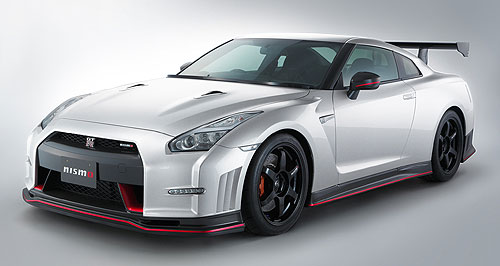Make / Model Search
News - General News - GovernmentUproar grows on parallel import changesNot happy: AADA chief executive Bruce McDonald said he was disappointed by the government’s decision to change the laws around private vehicle importation. Nick Xenophon rallying support against proposed changes to new vehicle import laws13 Feb 2016 By IAN PORTER PRESSURE is continuing to mount against the proposed changes to laws relating to personal importation of new cars – known as parallel importing – outlined by the Turnbull government this week. Independent South Australian Senator Nick Xenophon has criticised the proposed changes at a press conference he convened in Canberra. The senator had asked several peak bodies to lend their support, including the Australian Automotive Dealer Association (AADA), the Federal Chamber of Automotive Industries (FCAI) and the Motor Trades Association of Australia (MTAA). However, Senator Ricky Muir has broken with Senator Xenophon on the issue and has come out in favour of the proposed changes. At his press conference, Senator Xenophon said the proposed changes to the Motor Vehicles Standards Act should be dumped because they would allow a “flood” of imported vehicles into the country. “Anyone who privately imports a vehicle under these proposed new rules will be playing unlucky dip because they won’t know what they will be getting and warranties won’t apply,” he said. He pointed out that the relaxation of import rules appeared to clash with the government’s position to encourage a proposal by France-based Punch Corporation to keep making cars at Elizabeth, South Australia, after General Motors ceases production.  Left: Independent senator Nick Xenophon. Left: Independent senator Nick Xenophon.“The government can’t have it both ways on this. Slackening the rules on parallel imports will make it harder for a local car-making industry to be revived post-2017,” Senator Xenophon said. AADA chief executive Bruce McDonald told the press conference that his association was both disappointed and surprised at the decision given the extent of consultation that had been conducted – more than two years – and the evidence presented to the government in that time. “I want to dispel one of the key assumptions that appears to underpin this decision,” Mr McDonald told GoAuto. “It is a myth that there is a lack of choice in the Australian market.” When Mr Fletcher introduced the proposed changes, the principal reason he advanced for making the change was that they would give Australian consumers more choice. Mr McDonald dismissed this argument out of hand. “The empirical evidence is undeniable and is based around the simple matter of the number of brands, the number of models on sale in a market of barely one million vehicles.” Mr McDonald said there were 67 brands selling cars in Australia, while the United States has 51, the United Kingdom 53 and Canada 49. “In contrast to other markets around the world, like the UK, the US or Canada, they all have fewer brands competing in a much larger market. “The belief that we need to increase the choice available to the Australian public and therefore allow them to personally import a vehicle of their choice, if that belief is based around the apparent lack of choice, the data proves that not to be the case.” Mr McDonald also took exception to the government choosing to place a new risk on car buyers, one that is not present in Australia now thanks to the various consumer protection laws. “The government is asking these people who want to import their own vehicles, to take on some substantial risks,” he said. These include the lack of history of the vehicle, the uncertainty that comes with a vehicle that has already covered 500kms or is up to one year old and that the customer is unable to say without any doubt as to where that vehicle has been in an earlier life. He also highlighted the fact that imported vehicles would not necessarily meet Australian crash standards. “Governments have made a lot of investment in educating the public when they consider purchasing a new vehicle. These vehicles will not have an ANCAP rating as we know it. “These cars will have very different warranty conditions compared with cars sold in Australia. It will depend on the individual vehicle. “The warranties being offered by the car manufacturers in Australia today are very attractive and are contributing to the buoyant nature of the Australian new vehicle market, in addition to the ongoing competition. In most cases they are more generous that what’s offered in other markets.” Mr McDonald also pointed out that one of the biggest risks with parallel-imported cars is the potential lack of spare parts and access to specialised service and repair facilities. Dealers from whichever brand the imported vehicle is will not be bound to offer help or assistance. “Australia’s car dealers over many years have invested huge amounts of money in facilities, training and in diagnostic equipment that allows them to deliver a service ‘peace of mind’ factor for their customers regardless of the vehicle or the brand,” Mr McDonald said. In a separate press release, Independent Victorian Senator Ricky Muir backed the proposed changes, saying he believed they would help drive down the overall cost of new vehicles in Australia by creating competition in the new vehicle market. “They will be required to be inspected by an independent third party inspection service to verify the vehicle condition, odometer reading and identity,” Senator Muir said. “The proposal also stipulates that a person can only import a vehicle under these arrangements no more than once every two years. This should provide some assurance to those who claim that by changing Australia’s vehicle import laws, the government will be ‘opening the flood gates to dangerous old cars’ and that we will be ‘making the age of our nation’s fleet older’.” Senator Muir also applauded the proposal to move away from the “pre-1989” definition of a classic vehicle and to adopt a rolling 25-year date for the definition of a classic car. Any vehicle over 25 years of age will be considered a classic under the proposed legislation. He also applauded the relaxation of limits on how many vehicles a registered workshop can import. “The removal of the 500 vehicle restriction that each Registered Automotive Workshop was allowed to import is also a step in the right direction.”  Read more11th of February 2016  Import savings nil, but big risks when buying offshoreData shows that government parallel imports gains make no sense10th of February 2016  Uproar over car import changesCompliance plate abolition a gift to 'crooks, shonks': Benz10th of February 2016  Parallel imports get the green lightFederal government proposes changes to laws allowing parallel new-car imports |
Click to shareGeneral News articlesResearch General News Motor industry news |











Facebook Twitter Instagram